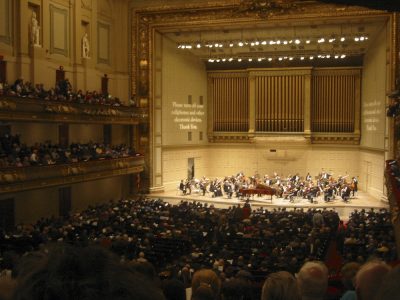
Under a presidential administration that’s catalyzed several nationwide protests, echoes of chants and speeches cluttered the Boston Common Friday, as Boston University’s School of Music and the BU Arts Initiative explored the idea of protesting without words.
The panel served as a prelude to a concert, Protest without Words: the Arts & Social Change, at Symphony Hall on Monday night, which featured Boston University’s Symphony Orchestra, Wind Ensemble and Symphonic Chorus.
Moderator Louise Kennedy, senior writer and editor for BU Development Communications, began the panel by asking composer Kirke Mechem about his song performed at the concert, “Songs of the Slave.” The song is one piece from an opera Mechem wrote called “John Brown.”
The opera follows the storyline of John Brown, a 19th-century abolitionist known for his radical views. When Mechem started researching Brown, he found the historical figure to be very different from the fanatic some history books and other texts had made him out to be.
Kerri Greenidge, co-director of the African American Freedom Trail Project, volleyed off of Mechem’s story by stressing the importance of context when creating art. Whether an artist is creating a historical piece or not, the person should understand what has already been made, she said.
The three panelists agreed that art is always political. They said that even works coined to be non-political are making a political statement.
When trying to include political context in pieces of art, Greenidge recommended that students seek out primary sources to learn information without the filter of an author’s bias.
“I would also suggest reading at least three national newspapers or political magazines, and just keep reading those, even the articles you don’t want to do and you don’t understand,” Greenidge said in an interview. “Then that will help give you a filter after a while of what is relevant, what is to be questioned and then just what the conversation is.”
Harvey Young, dean of the College of Fine Arts, said now is an especially great time for art.
“We’re in a performance moment where the arts, music, theater [and] visual arts are more dynamic now,” Young said. “They proliferate much more widely than in the past.”
Young said he finds the internet’s potential impact on the arts to be exciting.
“When we’re talking the proliferation of radio and media and YouTube and all those things, there’s never been a better time to make art,” Young said. “It’s never reached more people, it’s never been more public, it’s never been more relevant.”
Kennedy related the greater proliferation of art to more representation.
“There’s more of a room for different stories, narratives, that were suppressed before,” she said.
Greenidge sees ambition in her students to create art with political messages, but she said younger artists sometimes lack context –– whether historically or politically –– to create pieces that can stand the test of time.
“What is inspiring is that [my students] are very political,” Greenidge said. “They are very much looking for art everywhere, and they are very much incorporating that into their political orientations in the way they see the world, and my job for them is then making sure that that’s rounded, that they’re not perpetuating the myths of the past.”
Michael Fang, a freshman in the College of Arts and Sciences, sang “Songs of the Slave” in the chorus at the concert. He said he appreciated Mechem’s inclusion of American styles.
“I think Mechem has continued to promote (as previous US composers like Gershwin did) uniquely American culture into the classical genre by incorporating spiritual and gospel music in his opera,” Fang wrote in a message.
Young said art is so powerful is due to its ability to create a community and common bond.
“Anyone can create art … and art creates community essentially overnight, within a moment’s notice,” Young said after the panel. “And so you can create new work that reflects your experience, that offers a perspective on the world, and immediately and essentially with time will be able to talk to tens of people, hundreds of people, thousands of people, and so on. And that makes it, in my experience, the perfect medium.”


















































































































